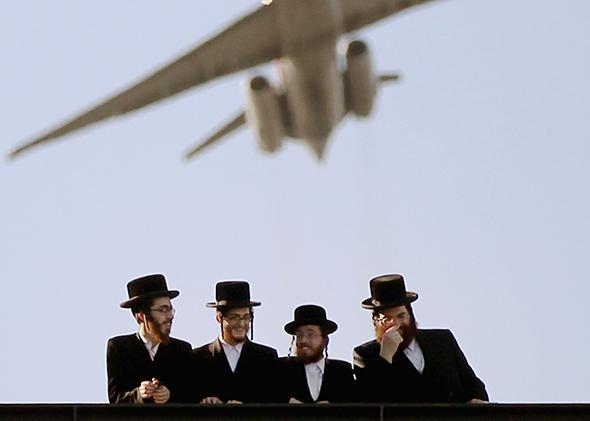It’s one of my ironclad rules of travel. When you’re in an airport, you pretty much always see Orthodox Jews. Occasionally in families, but generally in small groups of men, conspicuous by their dress and the Talmud volumes they often carry. At the New York airports and Miami, obviously. In European heavyweights: London, Zurich, Paris, and Berlin. But I’ve also noticed them in areas that aren’t hubs in the global diamond business or known for their high density of storefront shuls and rabbinic dynasties: in Los Angeles, New Orleans, and Detroit; in Budapest and Prague; in Buenos Aires and Bogota.
Everywhere, it seems, except Asia. I’ve been through a dozen-odd airports in five Asian countries in the past several years and have yet to notice one of my black-clad co-religionists. Until earlier this month.
I was sitting on the tarmac of Beijing Capital Airport with a group of U.S.-based journalists—the only non-Chinese among the 200 or so passengers waiting to take off. We were headed for Wuhan, a large city in China’s heavily industrial interior known as one of the nation’s “stove cities” because of its intense, humid summer heat.
Just as the doors were about to close, a vision appeared in the aisle: A tall man with thick side curls and a bushy brown beard, wearing a tall black hat and black suit. Still zonked from jetlag, I shook my head back and forth a couple of times, half-convinced I was hallucinating. The cobwebs cleared, but the man quietly walked past and took his seat.
At the baggage carousel in the airport in Wuhan, two hours later, I approached. “Vee gaytz?” I said, using about 30 percent of my Yiddish. “What’s a nice Jewish boy like you doing in a place like this?”
He looked me up and down and said, “Three guesses.”
I was stumped. Wuhan is not a place with a vestigial Jewish presence, like Harbin, where a synagogue founded by Russian Jews in the early 20th century was just reopened. It’s not Kaifeng, the Silk Road town where a Jewish community thrived a millennium ago. Chabad, the Lubavitch sect that sends emissaries throughout the world to minister to expat Jews, has several outposts in large cities in China, but not in Wuhan. And while there’s a lovely, sprawling university rising from the lake in Wuhan (imagine Madison, Wisconsin, but with lots of smog and no Midwesterners), there’s no Hillel house on campus. (Fun fact: Wuhan U’s alma mater is to the tune of Cornell’s venerable “Far Above Cayuga’s Waters.”)
Here were my guesses.
- He was a character in a Nathan Englander short story come to life.
- He was scouting out low-cost suppliers of prebuilt sukkah kits that could be exported to Brooklyn.
- He went out for Chinese food, as Jews are wont to do, and got horribly lost.
“I can’t even begin to guess,” I said.
With that, he produced a card. Rabbi David Moskowitz, originally of Monsey, New York—home to a large community of Orthodox Jews—and now based in Israel, is the chief executive officer of Shatz Kosher Services, which inspects factories, farms, and other food suppliers to ensure they adhere to strict standards of kashrut. The company has offices in Brooklyn; in Ashdod in Israel; and in Qingdao City, the eastern Chinese city that was once a German outpost.
Yes, the world’s manufacturing base has largely moved to China. But I can’t imagine there are many factories producing gefilte fish, frozen stuffed cabbage, and little hot dogs wrapped in blankets. In fact, China is one of the most unkosher places you’ll find. There isn’t much mixing of milk and meat, to be sure. But here are a few of the nonkosher things I encountered in Wuhan: shrimp, prawns, hairy crab, pig ear, fried spare ribs, various other parts of pigs, eels, and bullfrogs. Keeping the manifold trayf produced and consumed in such volume here segregated from the food supply would seem to be a Sisyphean task.
What followed was a quick lesson not in Talmud, but in globalization.
Moskowitz was here, I learned, not because Manischewitz has relocated deep in China to find lower labor costs. Rather, food supplies are now global. Additives, spices, and ingredients can come from literally anywhere. Food products that originate in one region can be assembled and processed all over the world. The U.S., for example, sends a large portion of the fish it produces to be processed in Asia and Norway. And while only a small minority of the 14 million Jews in the world keep kosher and fret about package markings, kashrut symbols have evolved into something more like universal signs of quality and care. Hebrew National is owned by the conglomerate ConAgra. Clearly, enough Chinese firms deep in the country’s interior are sufficiently interested and connected to the world’s markets that they are eager to have Moskowitz come give his blessing to their operations. (Here is Moskowitz’s China website.)
“What do you eat when you’re here?” I asked.
He pointed to a second roll-aboard suitcase.
This, too, is how globalization is lived today. An Orthodox Jew, dressed for the Pale of Settlement, wanders around the hazy, clogged roads and byways of Wuhan, in the 90-degree heat, explaining the intricacies of kashrut to Chinese factory operators, and lugging his own meals around with him. What a lonely existence this must be. The Chinese put a great premium on eating communally, sharing dishes and meals off a Lazy Susan. So, too, do Jews. For as long as he was in Wuhan, Moskowitz would be disconnected from both cultures. I encountered one other Jew in Wuhan, a diplomat in the foreign service, who said that the community managed to mount a small seder at Passover. How odd to find yourself in a country of 1.35 billion people—and have nobody with whom you can break bread or pray.
